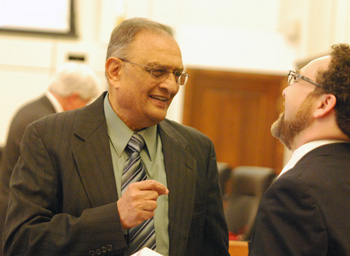Washtenaw County board of commissioners meeting (April 20, 2011): The county’s finances were the focus of Wednesday’s meeting, which included a presentation of the annual equalization report. That report is the basis for determining taxable value of property in the county, which in turn indicates how much tax revenue is collected by local taxing entities. In the world of municipal finance, the equalization report is a very big deal.

Raman Patel, director of Washtenaw County's equalization department, presented his annual report at the April 20, 2011 board of commissioners meeting. (Photos by the writer.)
Raman Patel, director of the county’s equalization department, told commissioners there was a 2.85% drop in taxable value this year. That’s an improvement over last year’s decline, when taxable value of property in the county fell 5.33%. It’s also a smaller decrease than was projected when preparing the county’s 2011 budget, which was built on the assumption of an 8.5% drop.
The impact on local taxing entities varies. The city of Ann Arbor saw a 1.21% drop, for example, while taxable value in Ypsilanti Township fell 11.39%.
The report also highlighted a shift in the county’s largest taxpayers. Just a few years ago, the top three taxpayers were Pfizer, General Motors and Ford. Now, they are Detroit Edison, McKinley Associates and Toyota.
The meeting also included a presentation of the 2010 comprehensive annual financial report, or CAFR. Kelly Belknap, the county’s finance director, highlighted the fact that the county ended 2010 with a $5.5 million general fund surplus – slightly more than the $5.3 million calculated to carry over into the 2011 budget. Mark Kettner from the accounting firm Rehmann Robson, which conducts the county’s audit, was also on hand to give a brief report on the 2010 audit.
In other business, the board approved an amendment to the brownfield plan for BST Investments in Dexter, and set two public hearings for their May 18 meeting related to brownfield plans that are being proposed: (1) Packard Square, a complex off of Packard Street on the site of the former Georgetown Mall; and (2) the LaFontaine Chevrolet redevelopment at 7120 Dexter-Ann Arbor Road in Dexter.
The board also authorized the office of the water resources commissioner to take court action in setting winter lake levels at Portage and Baseline lakes. The office operates the dam at Portage Lake that controls those levels.
During their time for communications, commissioners raised several issues, including: (1) a call to support the special education millage renewal, which is on the May 3 ballot; (2) discussions about consolidating the office of community development, ETCS (the employment training and community services department) and the economic development & energy department; and (3) what to do about the growing deer population.
Wednesday’s meeting began with a tribute to the long-time director of the Washtenaw Community Concert Band, Jerry Robbins. [Full Story]





